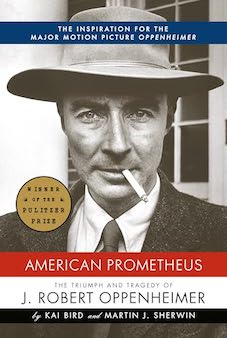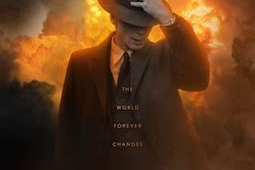American Prometheus: the triumph and tragedy of J Robert Oppenheimer

American Prometheus: the triumph and tragedy of J Robert Oppenheimer, by Kai Bird & Martin J Sherwin.
Each August, the destruction of Hiroshima and Nagasaki is debated by those who considered it essential to prevent the loss of more life during a conventional assault on Japan, and those who believe Tokyo would surrender anyway when the Soviet Union attacked Manchuria.
The 2023 Hollywood biopic of Robert Oppenheimer, the father of the atomic bomb, was based on this 2005 Pulitzer-prize-winning book. Yet, the complicated character described by Bird and Sherwin is far more interesting and political than the film's dreamy, detached figure, enticed from an ivory tower to run the Manhattan Project at Los Alamos.
Like many of his contemporaries, "Oppie" wanted an open, democratic discussion about America's nuclear deterrent, including the hydrogen bomb, which he considered a genocidal weapon. He also wanted the technology shared with the Soviet Union, linked to arms control mechanisms to ensure nuclear weapons were never again used.
However, the book, rather than the film, illustrates how Oppenheimer relished being a Washington player. He assumed his war-time achievements, charm and intellect would gain him admission to the US Establishment. Instead, he was a victim of Joseph McCarthy's campaign to unmask "disloyal" left-wing Americans, a jihad that rendered even President Eisenhower mute with fear. It is not hard to draw parallels with the current iron grip Donald Trump has on the Republican Party.
Oppenheimer was born into a wealthy, cultured Jewish New York family. At a time when German mathematicians and physicians led their field, he was educated at Gottingen and Leiden Universities. The film downplayed the man's all-round intellect and privilege, presumably because a modern audience would struggle to identify with someone who owned Rembrandt sketches, learned Greek to read Homer in the original, and mastered Dutch in three weeks so he could give a physics lecture in the language.
Back in the US, teaching at Berkeley, Oppenheimer and his friends were deeply involved in supporting the Spanish Republicans, union rights for farm workers and teachers, and desegregation. Despite his politics, he was chosen to lead the Manhattan Project, an enormous, complex and expensive undertaking, created from scratch in the New Mexico desert. He was selected not just for his brilliance as a physicist, but due to his charisma and ability to organize and lead. The film portrays Oppenheimer as a vague brain box with a chaotic personal life. The book, however, describes how he assembled and directed the world's finest scientific minds; no easy task given the egos involved.
Oppenheimer's team believed they were in a race with the physicists who had not escaped Germany, seeing their mission as stopping fascism in its tracks. After Germany's surrender, they were less enthusiastic about unleashing a weapon that would slaughter Japanese civilians when it seemed Tokyo would eventually surrender. They were also dubious about Edward Teller's enthusiasm for developing the massively more destructive hydrogen bomb.
The book describes the paranoid climate enabling the militarization of science and scientists, obliterating ethical considerations, and putting decisions in the hands of ignorant or cowardly politicians. Oppenheimer's enemies, aided by the FBI's Hoover, then destroyed his reputation during a biased inquiry worthy of the Soviet Union. Oppenheimer's "cosmopolitanism" (code for being worldly, Jewish, and too clever by half), aroused the suspicion of the same Establishment he longed to join. At six hundred pages, this is not an easy read. But it paints a vivid picture of a society still struggling to separate fact from disinformation.

















